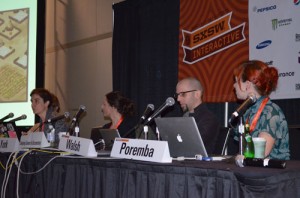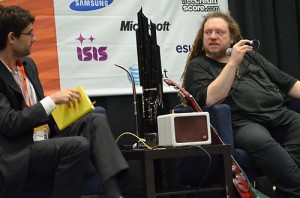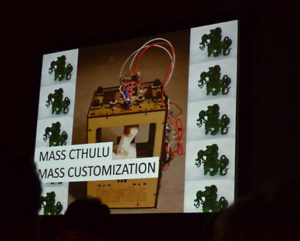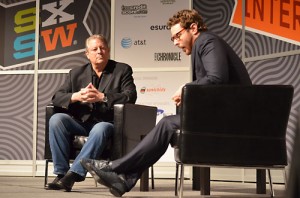The first panel I made it to was Designing Games for Documentary. This panel had members from academic programs (USC primarily), as well as artists, developers and designers. They demoed a range of games, covering topics such as cleaning up wall street, gender inequity, murder investigations, and platforms including board games, iOS and web based games. Peter Brinson stressed that a more important question than genre was whether one was working in the short or the long form. “All media makers should be interested in the short form. A short leaves them wanting more.” Tony Walsh demoed a non-fiction game his company had created where the user lived in a neighborhood and became involved in local issues, such as a garbage strike, and tried to convince others of his or her point of view. The player wins by convincing people their position is the correct one. “A person with more facts is a better negotiator, which is not necessarily true in real life”. Cindy Poremba demoed her iOS game Grime, which replicates the experience of a grafitti artist who washes part of a wall rather than writing on it.

Next up Jaron Lanier interviewed by Nicholas Thompson of the New Yorker Is Technology Making Our Lives Richer or Poorer?. Thoughtful and provocative. He started by playing a strange Darth Vader like instrument. They discussed his recent op-ed piece in the New York Times. “I am not anti-Facebook, I celebrate their success. However it becomes an act of will to avoid it.” “Facebook is not an open forum, there are rules and your data is not owned and controlled by you. Right now its ok, maybe not later.” (Interestingly, I posted a link to the controversial op-ed piece- on Facebook!) “No technology can foster creativity and relationships. There are always real people behind the curtain”. Lanier also talked about the problems that may be looming when more people lose their jobs because of technology. “Cars driving themselves – good, people are terrible drivers but lots of people will lose their jobs. Manufacturing will also go away, 3D printers are cool. There are many benefits, but what do we do with the people who lose their jobs?”
“Aristotle talks about the day when the machines get really good- we can free the slaves”. According to Lanier, Henry Ford understood that you have to grow the whole economy- the people who make the cars have to be able to buy the cars as well.
Lanier proposes that the industry needs to develop a universal commerce model rather than the current walled garden model. “monetize information to empower people.” Both the model of (anonymous) 4chan and (you must say who you are) Facebook are wrong. “People have to both own their own information and they should be able to reinvent themselves”.
I may come back to this post later to make it more than a series of quotes- this was an interesting conversation, not just a bunch of rambling thoughts. But I have to get back to work! So more Jaron later.


I listened to some of Ray Kurzweil’s keynote– it was interesting, but I was sleepy. What can I saw, it starts to get to you. Looking at my notes, he thinks Siri is pretty good (he helped develop voice recognition). He also emphasized the effectiveness of project based learning to teach kids.
Prototype vs. Sim: Validating Software & UX Design was frog design’s presentation on their approach to rapid prototyping. Jared Ficklin discussed the rise of the makers, with a shout-out to Cory Doctorow, and its influence on their process. Gregg Wygonik: “Making is designing.” “With desktop 3D printing, you can make anything”. “…convergence between digital and physical”. Robert Tuttle described the key proof of concepts needed in prototyping- perceptual, technical, logical and economic.
This too is available online as an audio file- visuals were great, but I am sure you can get the idea from tuning in.

Finally, Al Gore and Sean Parker (of Napster fame) talking about social activism and social media. This seems to have been a bit of a last minute addition, in a gigantic packed hall that gave me flashbacks to the movie screening mega-room at Comic-con.
Another interesting conversation, though. Sean Parker, discussing the origins of his activist social media platforms which include Causes, NationBuilder and Votizen-“In 2006, I began to think why don’t any of these platforms DO anything?” Al Gore (citing Malcolm Gladwell) “There’s a tendency to think that if you get someone to point and click the ties are often weaker and less durable.” When Parker said “The change that we want to see is not going to come from Washington” Gore quickly spoke up “I can confirm that” and the crowd roared. Gore made a passionate plea for campaign financing reform: “75-80% of campaign financing spent on 30 second TV ads, and these are not the federalist papers.”


I missed The Future of HTML5 Motion Design– disappointed, but I had some stuff to do, including uploading way too many pictures to flickr and answering emails for work. Luckily, there is an audio recording, will check it out later.
